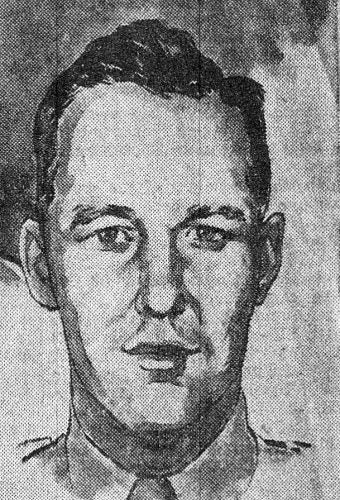- Lieutenant Colonel
- WW II
Biography
George Irving Cook was born in East Greenwich, Rhode Island. He was one of seven children born to George N. and Anna May Cook. He was an outstanding high school scholar and athlete. George entered Rhode Island State College (RISC) in September 1925 with the class of 1929, majoring in Business Administration. He was a member of Lambda Chi Alpha fraternity, Captain of the track team, member of the Student Council, Military Ball Committee, Glee Club, Economist Club and Rhode Island Club. George participated in the Rhode Island State College Army ROTC program and was commissioned a Second Lieutenant of Artillery upon graduation in June 1929.
Immediately following graduation, he reported to Fort Adams, Rhode Island for his two weeks of US Army Reserve field duty with the Rhode Island National Guard. He served in the Rhode Island National Guard for thirteen years in numerous troop-leading positions.
Major Cook was called to active military service with the 243rd Coast Artillery, Rhode Island National Guard, reporting to Fort Stewart, Georgia on 1 August 1942. Major Cook was appointed as the Commanding Officer, 451st Anti-Aircraft Automatic Weapons Battalion and arrived in North Africa on 18 March 1943. His unit moved to Italy on 16 September 1943 and was reorganized and redesignated on 12 December 1943 as the 451st Anti-Aircraft Artillery Automatic Weapons Battalion.
The 451st Anti-Aircraft Artillery Automatic Weapons Battalion took part in the allied amphibious landing known as “Operation Shingle” in the Italian Campaign against German forces in the area of Anzio and Nettuno, Italy on 22 January 1944. The landing and continued fighting was intense, and the Germans bombed the allied positions daily. The Germans also stopped the drainage pumps and flooded the reclaimed marsh with salt water, planning to entrap the allies while continuing to rain shells on the allied positions. The Allies finally broke out of the beachhead in May 1944.
Lieutenant Colonel George Irving Cook was killed in the explosion of a land mine during the battle for Anzio on 12 May 1944. He was awarded the Purple Heart Medal (Posthumously) and buried with full military honors in the Florence American Cemetery in Florence, Italy.
Lieutenant Colonel George Irving Cook was a son of Rhode Island who answered the call to service during World War II and gave his life in service to Rhode Island and America. He was survived by his wife Bertha. He is a heroic member of the “Greatest Generation.”
Education
1929

